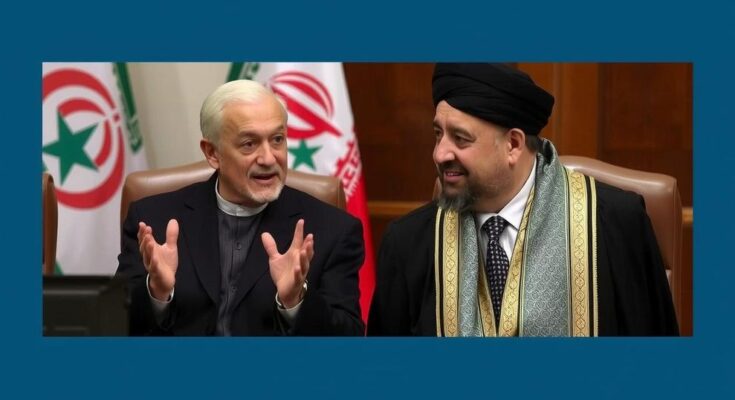In a recent interview, Syria’s new leader, Abu Mohammad al-Julani, called for Iran to reconsider its regional interventions while advocating for inclusive governance and potential future elections. He emphasized the need for stability and dialogue among all factions and indicated that the new administration is looking to strengthen ties with regional powers like Saudi Arabia and Russia.
Syria’s new leader, Abu Mohammad al-Julani, who is also known as Ahmed al-Shara’a, expressed a desire for Iran to reassess its regional interventions in a recent interview with Al-Arabiya/Al-Hadath. He remarked, “a broad segment aspires to a positive Iranian role in the region” and indicated expectations of favorable statements from Tehran. Al-Julani conveyed that Syria is potentially four years away from conducting elections, emphasizing that the leadership transition from the Assad regime to the new administration could foster stability throughout the Middle East.
In light of recent events, Al-Julani has engaged in numerous discussions with Western diplomats and neighboring countries to gather support, while addressing rising sectarian tensions and protests in regions such as Lattakia, Damascus, and Homs. He acknowledged the returns of defected Syrian soldiers and stressed the need for a peaceful transition of power, stating, “I do not consider myself the liberator of Syria. Everyone who made sacrifices liberated the country.”
Al-Julani projected that a new constitution for Syria will require about three years to formulate, which would consequently delay elections by four years due to the necessity of a comprehensive population census. He advocated for a National Dialogue Conference that incorporates all societal segments, acknowledging existing territorial divisions in Syria. He articulated that citizens may begin to experience substantial service changes in approximately a year, while also promising to safeguard the right to protest.
The new leadership intends to dissolve the various factions involved in the conflict through a national dialogue, encompassing groups like Hayat Tahrir al-Sham and other armed entities. Al-Julani expressed intentions to negotiate with the Syrian Democratic Forces (SDF) to integrate them into the national military framework, highlighting the importance of the Kurdish population in Syrian society.
Furthermore, he conveyed hopes that a new United States administration under President Donald Trump might alleviate sanctions imposed on Syria. Al-Julani expressed appreciation for the efforts of Saudi Arabia, recognizing its significance in Syria’s future, and alluded to potential investment opportunities stemming from this relationship. He acknowledged Russia as a key supporter of Syria, citing its historical role in the alliance with the previous regime, and noted that recent Russian remarks towards the new government have been encouraging.
Following the recent fall of the Assad regime, Syria has entered a critical period of transition, characterized by shifting power dynamics and complicated relationships with regional and international players. Abu Mohammad al-Julani, the new leader of Syria, aims to navigate this transitional phase by seeking cooperation from Iran, fostering a more inclusive governance structure, and establishing dialogue with various factions. The complexities of Syrian society, marred by historical divisions, underline the necessity of a comprehensive approach to governance and conflict resolution.
In conclusion, Abu Mohammad al-Julani’s leadership represents a significant juncture for Syria, marked by aspirations for stability, inclusivity, and the resolution of regional tensions. His calls for dialogue and cooperation with Iran and other factions reflect a commitment to unifying the country and reinvigorating its governance structure. The forthcoming years will be pivotal in determining the trajectory of Syria as it seeks to rebuild and reconcile its fractured society.
Original Source: www.jpost.com




